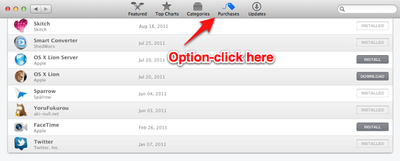Macworld points out that with the launch of OS X Mountain Lion today, Apple has seemingly removed OS X Lion from the Mac App Store. However, users can re-download it -- and then create a Recovery USB Key -- if they have already purchased it.

Folks who already bought Lion can in fact re-download it, if they hold down Option when clicking on the Purchased tab. That secret shortcut makes Lion reappear in the list.
With the Option key trick, customers who own Lion and, for whatever reason, want to install it fresh on a compatible Mac, can do so.
Customers who never purchased Lion are out of luck as far as the App Store goes, though the OS X Lion USB Thumb Drive is still available via the Apple Online Store for $69.


















Top Rated Comments
Apple already has a well-established business model for selling older versions of its hardware and the software that's on them, and you can find it in the Clearance and Refurbished sections of the Apple Store. So extending that model to the App Store would be well within the bounds of Apple's retail tradition. Apple will continue to support Lion for at least the next year and Apple can still make money selling Lion to all of those users who can't upgrade to Mountain Lion. Plus, since Apple wouldn't have to produce and ship hard disks, keeping Lion available as a download on the App Store would cost Apple virtually nothing. Surely Apple can have the App Store detect when a Mac that accesses it can't upgrade to ML, and for those Macs the App Store can still stock Lion, not forever, but at least for a reasonable amount of time to give users who were caught off guard by the new requirements of ML a chance to upgrade legally.
Makes perfect sense, if "planned obsolescence" is your sales model.
They'll probably just hide the purchase link like they did with Lion :P You can still get updates, just like you always have, without actually needing to go into the apps' individual page; it will just show up in the software update location.
I find that argument unconvincing. There would have been other methods to make customers aware of the difference, like an overview page or a pop up if customers attempt to download it, although they could get Mountain Lion instead. They could also just hide it entirely when the App Store detects that the customers Mac is capable of running Mountain Lion. These are all other options Apple could have taken to ensure that customers get the latest software, but dont leave existing customers with Snow Leopard.